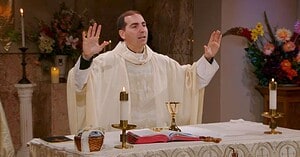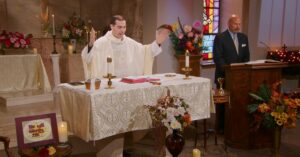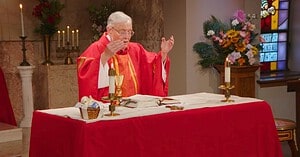Easter Sunday of the Resurrection of Our Lord
Homily Video
Easter Sunday of the Resurrection of Our Lord Homily Transcript
Well, I want to welcome all of you who are part of the board of Mercy Home but also from St. Robert Bellarmine Parish and to wish all of you a blessed Easter, you and your families, but also a greeting to all of you who are watching, viewing, and celebrating with us this Easter Day mass here at Mercy Home. I’m so grateful to Fr. Scott Donahue and all of his staff for the wonderful way that they prepare everything and also provide his great service to the people of God here in the archdiocese and beyond.
I have to tell the people of St. Robert Bellarmine that the parish that I was pastor of in Omaha before becoming a bishop in 1998, that seems like a long time ago, and it was, was St. Robert Bellarmine in Omaha and I still have great affection for that parish community that is dedicated in honor of a great saint, Jesuit saint, Cardinal Bellarmine, St. Bellarmine.
We hear the Gospel today end with those words, “They did not understand that He had to rise from the dead.” And we come here on this Feast of Easter as believers. We really can’t comprehend what it means for Jesus to be raised from the dead. It’s an experience outside of our field of living. We don’t know anybody else who has been risen from the dead. We’ve never met anybody like that, and the disciples hadn’t either.
And so, we are called to, before we understand it, to still believe in it, and that’s very hard for us rational-minded individuals to believe in something that we don’t fully understand. How do we have that kind of faith? How do we have the kind of faith that says that “I trust in Jesus being raised from the dead” without really understanding it? What does that mean? What does it take? How do we get there? Well, we have here in this Gospel text a kind of a template, a kind of an example of how maybe we should foster that kind of faith.
The first thing we see is that Mary Magdalen, a woman who was close to the Lord did what she did every other day what we do every day. We get up in the morning. And she got up early that morning while it was still dark. The sun was just maybe coming over the horizon and she had an inspiration to go to the tomb. We hear in the other Gospels that she went to put the spices there at the tomb, which was the custom, but she went and experienced on that day something altogether new.
She was going thinking that the body of Jesus was still there, but the stone was rolled away. She didn’t go into the tomb but she saw that there was something different. So coming to the kind of faith we should have begins with how we treat each day when we get up. Is it an opportunity of God’s grace to work in our lives? And the problem is that, as we get older, the days fly by and they kind of all accordion together. They all kind of crunch together in a blur.
But to have a real vivid faith means to start each day consciously aware that each day is different. Didn’t Jesus, when he taught us to pray, give us a word, “Give us this day our daily bread?” Just think in your own lives, how many times you have given yourself over to useless worry and anxiety because you’re not thinking about that day but the days ahead. You’re thinking about what’s going to happen two or three weeks or maybe a year from now.
We seem at times as a collective body of people to have that kind of fear and anxiety. We see it taking place in the world today in our own nation as people seem to be divided and polarized so much because we’re afraid. We have anxieties about the future. What Jesus calls us to is the kind of faith that steals our hearts, that centers us, realizing that today’s worries are enough for the day, as he tells us.
To have that kind of tranquility of heart, realizing that every day God is doing something new in our lives and we should pay attention to it. Can we pay attention each and every day to the uniqueness of each day? I suggest that to you, and if you do, there will be a calmness, a sense that there is something new happening in your life, that you can believe that Jesus is with you as the risen Lord, even though you don’t understand it, to have that kind of faith.
The second thing that we see in the Scriptures is that Mary Magdalene just doesn’t go back and kind of think about this herself. She goes and tells Peter and the beloved disciple, who we believe is John. She shares this. She realizes that her faith is not something just for herself but rather it’s to be shared, and she has to receive the support of that community that’s there.
So often in our world today, we diminish faith by making it something personal rather than shared. The very word “religion” means that we have bonds and links with each other in which we share our faith with each other. Pardon me. And so, Mary reminds us today that we have to see that our faith is shared.
Some years ago, a father of a large family was telling me about his 16-year-old daughter coming him to one day and saying, “You know dad, I know we go to church as a family every Sunday but I don’t want to go anymore because, you know, it’s the same old thing week after week, and I don’t get anything out of it.” Now, I know this might be shocking to you that a 16-year-old would ever say something like that.
So, calm your fears here. And the father didn’t get angry. All he said was, “You know, I get that. It’s tough to do something that’s monotonous, that’s the same old thing, and especially if you don’t get anything out of it.” He said, “For instance, for the last four years, I’ve been getting up at 5:00 in the morning three times a week to take you to swim practice, and I sit there and I watch you go back and forth, back and forth, and it’s the same thing, and I don’t get anything out of it.”
But he says, “When I see what it does to you and how it really gives you joy in your life and makes a difference and rejuvenates you, then I say it’s good enough for me to be there because of what it does for you.” Think of that then when you go to mass. Look at the people around you who need a young face, who need maybe a family who’s there to comfort them, to encourage them especially if they’re having a bad time.
Go there not because of what you’re getting to get out of it because of what you’re sharing with other people. That’s what Mary Magdalene understands. She comes to the disciples because she wants to share this faith. She wants to share this experience and also receive support for them. Easter should do that for us. Maybe that’s why people, if they don’t come to mass regularly, like to come to those days of Easter and Christmas and they surely come on Ash Wednesday too, because they realize that faith has to be shared. It’s not a private thing.
And so, to be able to believe without understanding has a component of how our faith enlivens, enriches other people. That’s part of our faith. We do it not because we always understand or maybe even we like it or maybe we get anything out of it but because we know that we’re bound to one another, we’re linked to one another. We need one another.
And the final thing we see in the reading is that Peter and the beloved disciple get to the tomb and find it empty. Doesn’t that resemble the kind of emptiness sometimes we feel in our own lives? It’s hard to believe because we feel empty. We have run out of resources. We try to grab a hold of something to believe in and people disappoints us. People in the church have disappointed us, and we feel sometimes left empty. And it’s right then that the Lord reminds us that his Grace is still at work in us.
A mother of a family was telling me that the family came back from burying grandmother. They had a funeral for grandmother and they were sitting around the table and she mentioned how much she really took heart in the opportunity to be around her grandmother when she was dying around her bed, because it gave them a chance to tell her how much they loved her and how much she love them. It was a great sharing. She said, “That’s the way that I’d kind of like to die, with my family around.”
And so that sparked a conversation to the people around the table. How would you like to die? One person said, “I’d like to die throwing a big party.” Another one said, “I’d kind of like to die in my sleep because I don’t want to have any pain.” And she noticed, as they were talking, that her young daughter of seven years old, Rachel, was sitting there quietly, reflecting. Maybe she thought that this discussion about death was too much for her daughter.
And so she said, “Rachel, tell me, what are you thinking? How would you like to die?” And Rachel looked up at her and said, “I’d like to die saving someone’s life.” What a great answer. It blew her mother away. “I’d like to die saving someone’s life.” Well, Rachel reminds us that even though at times we feel empty, deep down within us is a generosity, is the ability to love, to sacrifice, even though we feel as though we’ve sacrificed so much, we’ve given so much and we’re empty.
The resurrection is about believing that God’s mercies and graces are never exhausted in us. There’s always something more. Like Rachel, we can live our lives and die saving others. So today, as we hear this passage of trying to believe in the resurrection without fully understanding it, of having a faith that really doesn’t always understand. It’s a reminder that every day when we get up, we should thank God for that opportunity, something new will happen. It’s an opportunity for us to come together as a community, to realize that even though we don’t understand each other, we can believe that God’s working in other people and should not judge them.
And also, we should have the kind of faith that even when we feel at our limits and empty, like that tomb, that God is still working in us, even though we don’t understand it. In a moment, we’re going to renew our baptismal promises, as we do on Easter Day. We do it instead of the Creed. Let us hear each other say, “I do believe.” We say it individually, shoulder to shoulder, and let each other’s voices, as we say that, encourage one another. Encourage each other to have the kind of faith that even though we don’t always understand what God’s doing or what’s happening to us, we can still rely on him. And hopefully we can rely on one another.
Readings
First Reading:
Apostles 10:34a, 37-43
Second Reading:
Colossians 3:1-4
Gospel:
John 20:1-9
Featured Text
A special thank you this week to our guest celebrant, Archbishop Blase Cupich and our congregation from the Mercy Home Board of Regents and Saint Robert Bellarmine Parish in Chicago.
Discover More
The Most Holy Body and Blood of Christ
June 22, 2025
The Most Holy Trinity
June 15, 2025
Pentecost Sunday
June 8, 2025
Request Sunday Mass Guide
The Sunday Mass Guide sent to your home address
Spiritual nourishment and updates from the Sunday Mass community
Monthly reflections from Fr. Scott Donahue, our Principal Celebrant


